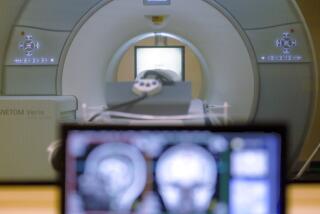Laughter Is Not Enough
- Share via
Frustrated by the inability of medical science to cure a variety of life-threatening ills, many people in recent years have adopted the belief that the patient’s attitude and frame of mind are important factors in treatment. This view got a big boost from Norman Cousins’ 1979 book, “Anatomy of an Illness,” in which he described how he cured himself of a serious disease by watching slapstick movies and laughing.
We’ve heard people say that a cancer patient who gives up in despair will die and that even thinking about cancer increases one’s chances of getting it. Some cancer therapists urge patients to conjure up in their minds the image of their white blood cells attacking their tumors. This is supposed to be therapeutic.
As it turns out, there is no evidence that mental state has any effect on cancer, according to a study published recently in the New England Journal of Medicine. Starting in 1982, Dr. Barrie Cassileth of the University of Pennsylvania Cancer Center charted the course and the states of mind of 359 cancer patients, some in advanced stages of the disease and some with breast cancer or melanoma. He found no difference in survival rates or recurrence rates between the happy patients and the sad ones. “The inherent biology of the disease alone determines the prognosis, overriding the potentially mitigating influence of psychosocial factors,” Cassileth concluded.
Based on this report, and noting that the medical literature contains little to refute it, the New England Journal of Medicine said in an editorial: “It is time to acknowledge that our belief in disease as a direct reflection of mental state is largely folklore.”
Many people will refuse to accept this finding, arguing that doctors are narrow-minded and are concerned only with protecting their lucrative but ineffectual practices. These people would rather believe in the power of positive thinking than in the facts. They want to imagine a cure where there is none. Life is more comfortable when questions are answered and problems appear solved.
So what? some people ask. Like chicken soup, happiness therapy can’t hurt. But the trouble is that it can hurt, if it keeps patients from real treatments--whose success rates, to be sure, are low, but better than the success rates of imaginary cures.
Unfortunately, positive thinking is no more a cure for cancer than krebiozen or laetrile. The disease is excruciatingly complex, and the way to attack it is through medical research, not pop psychology. Someday, perhaps, a cure will be found. But not yet.






